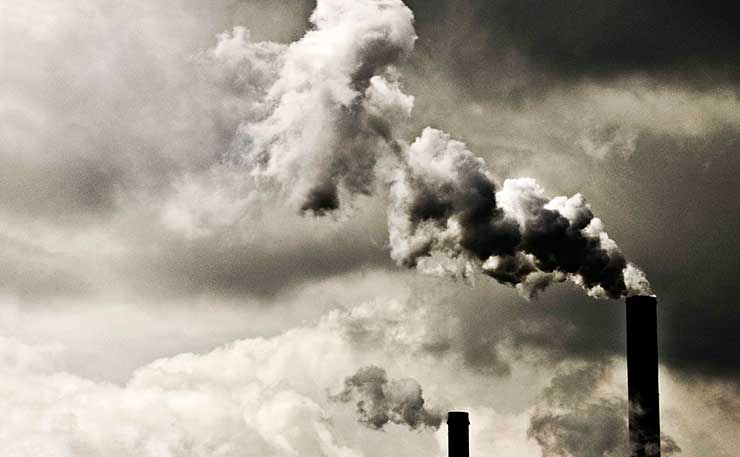Breaking the silence of the climate emergency is key to our future survival, write Richard Hil and Gideon Polya.
It goes something like this….
When it comes to all things “climate change”, the following seems to be the strategy adopted by the mainstream media: report extreme weather events by focussing on the physical damage and heart-wrenching human stories (pets and other animal stories are optional). Take lots of footage of the most dramatic scenes and overlay with gravitas-infused commentary.
Never mention climate change, or only if a “leading expert” is invited to do so or has mouthed off elsewhere, and otherwise reserve such discussion for the 7.30 Report or those increasingly popular panel discussions. Be mindful of the need to remain “objective” by avoiding any hint of “politicising” tragedies. Avoid words like catastrophe, emergency, disruption, carnage, disaster, apocalypse: we don’t want to frighten people unnecessarily, and in any case, the denialists are still out there so we need to acknowledge their presence – all for the sake of “balance”.
Remember, “climate change” does not top the list of most peoples’ concerns, according to polls conducted over recent months (although it’s getting up there!), so, don’t obsess. And whatever you do, don’t get too emotional. Avoid rhetorical flushes, hyperbole or gratuitous displays of concern and empathy. Always avoid any hint of despair. And never ever blame anyone for what’s happening. We don’t want the government – or worse, The Australian – breathing down our necks now, do we?
You’d think they’d speak out, right?
Given the terrible devastation wrought to the biosphere you’d think that the alarm bells would be ringing, and loudly – even on regular TV news shows. In the science community and among environmental groups, the bell ringing has been cacophonic for some time now. Many have exhausted all the warnings, and even the most graphic and alarming prognoses fail to persuade.
Faced with the anti-science culture that has emerged over recent years, some scientists have retreated to their laboratories, avoiding accusations that they are politically partisan activists. Others like James Hansen in the US and Will Stefan, Andrew Glikson and Lesley Hughes (among others) in Australia have taken a very different course, spelling out the full terrifying implications of the climate emergency and beseeching the powerful to act.
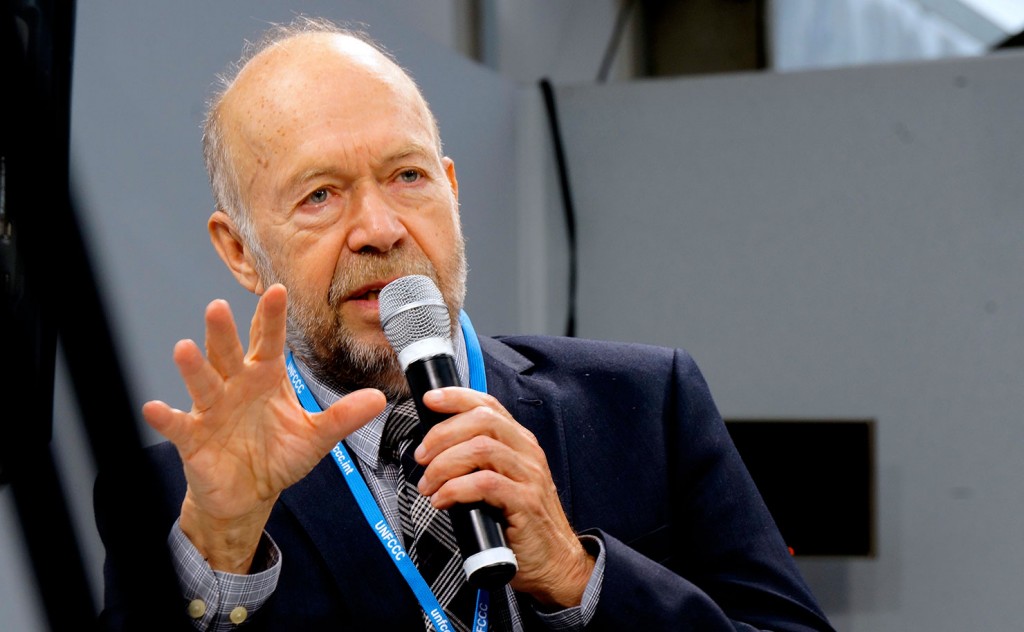
To be sure, the message that we’re in serious trouble has cut through in many quarters of civil society, even though governments are failing to respond in the ways demanded of them.
As Emeritus Professor of psychology, Joe Reser at Griffith University has observed, the majority of people consider anthropogenic climate change to be a real and present danger, but they often don’t know how to respond. For some, as social ecologist, Charlie Brennan puts it, the proposition that the earth is turning against us in a runaway, all-consuming fashion is simply too much to bear: “It’s the worst story we can tell”, biblical in scale, palpable in its existential terror.
Some scientists have come to resemble those doomsayers carrying sandwich boards with “the end of the world is nigh” scrawled across them. But when policy makers have one eye on securing votes and the other on ideological rectitude, it’s no surprise that climate scientists and others are at their wits end.
Recently, when they heard Prime Minister, Scott Morrison, belatedly announcing what climate scientists have long known, namely, that there is a direct link between “climate change” and greenhouse gas emissions, they were understandably sceptical, cynical even. And who can blame them?
Many viewed this sudden conversion as a vote-harvesting exercise rather than a display of moral commitment. After all, it was the very same Prime Minister, who in February of last year, cheerily brandished a lump of coal in the federal parliament, and who now presides over a shredded energy policy that includes coal in its “energy mix”.
Morrison is at one with his National Party deputy, Michael McCormack, who in response to the 2018 IPCC report, boldly declared “I’m very much supportive of the coal industry” – a government-subsided industry that exports more charred carbon around the world than any other country.
This is cynicism writ large, as large as the coal trains headed to the loading ports and the new mines currently under construction in the Hunter Valley and North Queensland.
A deafening silence
Government and mainstream media silence on the climate emergency have of course been a long time in the making. It’s a history well documented by numerous observers.
The current regime of silence is deafening. For example, a report titled Extreme Silence, by US-based advocacy organisation, Public Citizen, illustrated the failure of the US media to connect an extreme weather event – an unprecedented heatwave in June/July 2018 – to the climate emergency.
The report examined the content of the US’s leading newspapers by circulation, as well as news coverage on ABC, CBS, CNN, Fox News Network, MSNBC, and NBC. Newspaper content in the 13 states most impacted by the heatwave was also scrutinised. The conclusion?
With a few notable exceptions, major US media outlets are largely failing to connect these monumental weather events to climate change. Similarly, when local media report on record-breaking temperatures and extended heat waves that directly affect their readers, they typically fail to connect the events to the warming trends that scientists have been predicting for years. In fact, this report finds that media were significantly less likely to connect extreme heat to climate change when reporting during a major heat event.
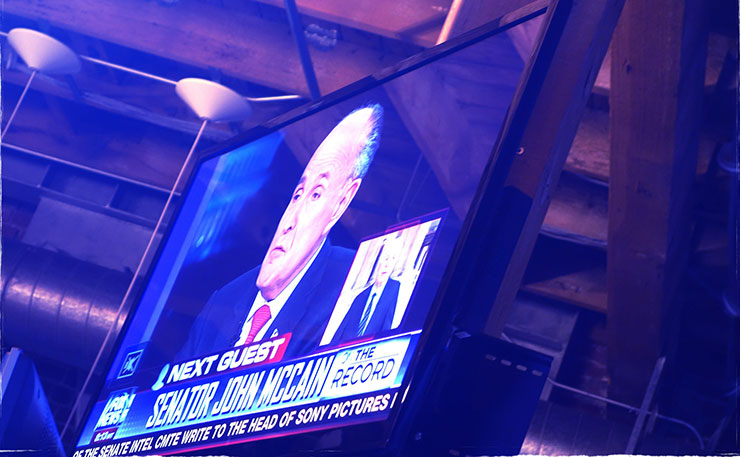
A similar culture of silence prevails among the Australian corporate media. Take one but glaring example. When the last IPCC report was published in 2018, the News Corp stable, which publishes a wide array of newspapers across the country, set about dismantling the report’s credibility through a combination of smears, innuendo and ill-informed dismissal.
Many of its newspapers chose not to mention the report at all on their front pages, or devoted only a few columns in their inside pages. Paul Barry on ABC’s Media Watch asked: “So how could those News Corp papers all but ignore this huge story, which The Washington Post’s Margaret Sullivan and ex-Guardian editor Alan Rusbridger reckon is the media’s absolute duty to report?”
It’s a good question. But even the truncated reportage was laced with unremitting negativity and cynicism.
The Daily Telegraph’s Miranda Devine wrote: “This week’s hysterical missive from the United Nation’s Inter-Governmental Panel on Climate Change (IPCC) is just the latest case of the boy who cried wolf”. Elsewhere in the News Corp coverage, the IPCC report was variously described (by non-science journalists) as “emotional”, “utterly dishonest”, “blackmail”, “alarmism”, “virtue-signalling”, “sanctimony”, and “the normal catastrophic stuff”. The 91 climate experts involved in the report (based on evidence derived from 600 peer-reviewed articles) were assailed with claims they were disoriented, biased, possibly corrupt and prone to exaggeration.
The assaults by News Corp on the IPCC report were part of a broad and well-funded movement of manufactured scepticism whose tentacles stretch around the world. At its heart, as noted by Naomi Oreskes and Erik Conway in Merchants of Doubt: How a Handful of Scientists Obscured the Truth on Issues from Tobacco Smoke to Global Warming, the movement involves an ideologically-driven war against the climate science in which dedicated academic researchers have been ridiculed and subjected to the most egregious of accusations – like they’re part of an orchestrated conspiracy to overthrow capitalism.
This movement – small when compared to the global environment justice movement – nonetheless reflects the mutually beneficial relationships struck between vested interest, lobbyists, compromised scientists and their political acolytes in an elaborate “game of mates” aimed at ensuring the pursuance of profit at all costs.

It’s a culture, as Adam Lucas from the University of Wollongong points out in The Conversation, in which former politicians and public servants become the highly paid servants of the fossil fuel companies as they bend the ears of political mates or provide insider information. The upshot, Adam points out (citing studies by The Australian Institute and academic researchers), is that “the mining, energy, property and gaming industries enjoy favourable treatment in exchange for their generous political donations, or at least are perceived to”.
Predictably, the close alliances that exist between senior politicians, former political staffers, and big business have had “a real and lasting impact on the perception of political transparency in Australia”, says Adam.
Business, profit, wilful ignorance
The endgame here, of course, is profit. As Tim Cadman, research fellow at Griffith University told us, for many corporate bosses and their shareholders, the climate emergency provides a wonderful opportunity for even more surplus value through initiatives like geo-engineering, new mining developments, and the expansion of ancillary industries.
We shouldn’t be too surprised by this because, despite all the stated commitment to “substantiality”, most of Australia’s leading companies have done precious little to take the necessary steps to alert investors and shareholders to the risks presented by the climate emergency – and their role in it!
Drawing on public information on the nation’s leading 72 Australian companies, campaigning research organisation, Market Forces, found a less than committed appreciation of the level of business risk posed by the climate emergency – or indeed a preparedness to do anything about this.
Lead analyst at Market Forces, Will van de Poll, remarked: “Companies are willing to make general statements recognising climate change as a potential risk but very few have gone into the detail of how climate change risks might materialise for their business and what they are doing in response.”
Thus, despite all the public rhetoric about climate change, our big companies and their investors appear oblivious to the dangers facing their investments and businesses. It’s an odd sort of cognitive dissonance based on business-as-usual and crass short termism. It also reflects an institutional culture, buttressed by various alliances, in which private interest subsumes just about everything else. Placatory noises from our leading companies only serve to reflect the wilful inaction that seems to characterise current responses to the climate emergency. It’s a business model of the most ghoulish and self-seeking kind.
Silence and common sense
There are multiple ways of responding to the climate emergency – some of course deny there’s any such thing. Human geographers and other social scientists have noted how dominant issues that define the experiences of everyday life can, in public discourse, be disappeared from the dominant narrative.
Italian theoretician Antonio Gramsci and later French sociologist Pierre Bourdieu and many others have noted how notions of the common sense, or what is regarded as normatively acceptable at any given time, is enmeshed in questions of power and interest.
The success of neoliberalism is in part attributable to the common sense idea that, as former British Prime Minister, Margaret Thatcher once put it, “there is no alternative” to free market capitalism or, as University of Colombia academic and once neo-conservative apologist, Francis Fukuyama insisted, that we have reached the “end of history” when it comes the liberal democratic political order.
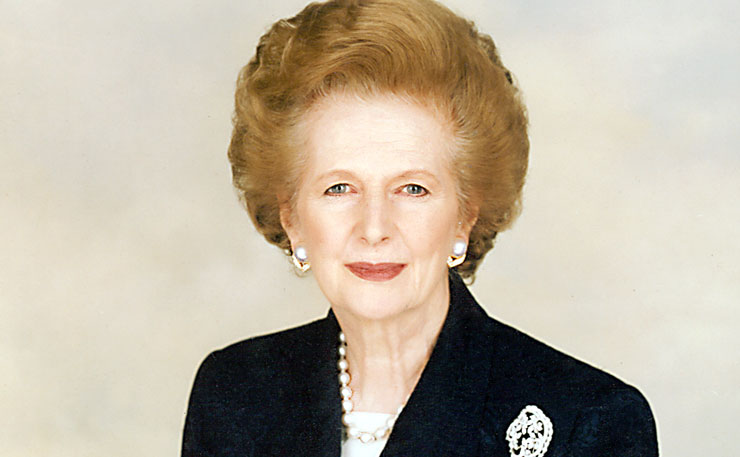
To ensure the privileged status of such ideas, competing worldviews, attitudes and stories have to be discredited, sent to the discursive margins, or simply ignored. The repetition of certain forms of language and ideas, their absorption into mainstream media coverage, political rhetoric and think tank reports can ultimately marginalise alternative narratives.
Such tactics have been deployed in relation to the so-called “climate change debate”. To suggest there is such is to create the impression of a balanced contestation of ideas with equal weight and validity attributed to both sides, such that the prevailing matter remains “unresolved” and therefore subject to continued doubt.
As noted in Merchants of Doubt, this is precisely how so-called “denialists” or “sceptics” have prosecuted their arguments against the overwhelming scientific consensus that exists on the link between the human activities and the climate emergency. Billions have been spent on the denialist’s cause in order to sow the seeds of doubt: easily done when the science methodologies are spuriously picked apart, extraneous assumptions introduced, and motives questioned.
Any flaw is pounced on, with the scientists in question subjected to the most vitriolic abuse. Defence of the science is of course an onerous business and in the process of such the denialists have succeeded in putting scientists on the back foot. But scientists have fought back against this anti-expert onslaught, protesting on mass – as in the case of the global March for Science in April 2018 – against the discrediting tactics of sceptics, many of them ensconced in governments around the world, including in Australia.
Silence and the path to climate genocide
Arguably, the failure of governments to robustly address the threat of the climate emergency occurs through acts of commission, (burning carbon fuels and exporting carbon fuels for others to burn) and acts of omission (failing to act on carbon burning pollution and greenhouse gas pollution).
At best, both orientations constitute a direct threat to global security and are, therefore, gross derelictions of duty, bordering on criminality. Arguably, by repeatedly failing to act urgently on the science, or by fudging or ignoring the human-related causes of extreme weather events, governments, corporations and the mainstream media engage in what can be described as “depraved indifference”.
The fact is that global warming from greenhouse gas pollution has been estimated to kill about 0.4 million people annually, but this is surely an under-estimate because 15 million people die avoidably each year from deprivation in tropical and sub-tropical developing countries, countries that are disproportionately impacted by global warming through more severe droughts, forest fires, floods, intense storms, and storm surges.
Several leading climate scientists, namely Dr James Lovelock FRS and Professor Kevin Anderson (Tyndall Centre for Climate Change Research, University of Manchester), have suggested that only 500 million people may survive this century if global warming is not requisitely tackled, this translating to a worsening climate catastrophe (climate genocide) in which about 10 billion people would die from climate change this century at an average rate of 100 million per year (that is, six times greater than the current 15 million avoidable deaths from deprivation each year).
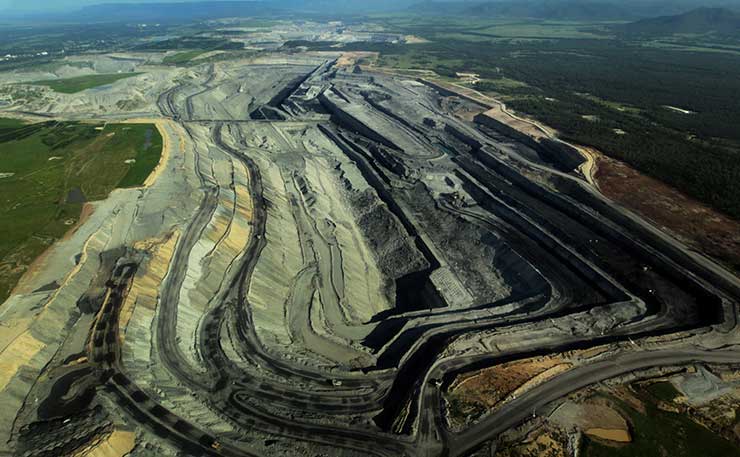
by D. Sewell, FLICKR)
Burning coal and other carbon fuels not only generates greenhouse gas pollution (variously causing global warming and ocean acidification through dissolution of CO2) but also generates toxic pollution involving carbon monoxide, various nitrogen oxides, and deadly fine carbon particulate matter.
Thus, as documented in the website “Stop air pollution deaths”, air pollution from carbon fuel burning ultimately kills about seven million people globally each year, with pollutants from the burning of Australia’s world-leading coal exports causing about 75,000 of these annual deaths.
Australia’s record when it comes to the climate, biodiversity and ecosystems is among the world’s worst.
ln addition to generating deadly carbon burning, Australia is among world leading countries for per capita greenhouse gas emissions, live methanogenic livestock exports, coal exports, natural gas exports, hydraulic fracturing (fracking), land clearing, deforestation, species extinction, coral reef destruction, and ultimately pollutant-generating iron ore exports.
Eminent climate scientist, Professor James Hansen, has recently declared that we must urgently reduce the atmospheric CO2 to 342-373 ppm CO2 from the present disastrous 407 ppm, and has estimated the cost of extracting 1 ppm of CO2 from the atmosphere at $878-$1,803 billion. Professor Stephen Hawking in addressing the question “Will we survive on Earth?” stated shortly before his death in March 2018 that: “We see great peril if governments and societies do not take action now to render nuclear weapons obsolete and to prevent further climate change”.
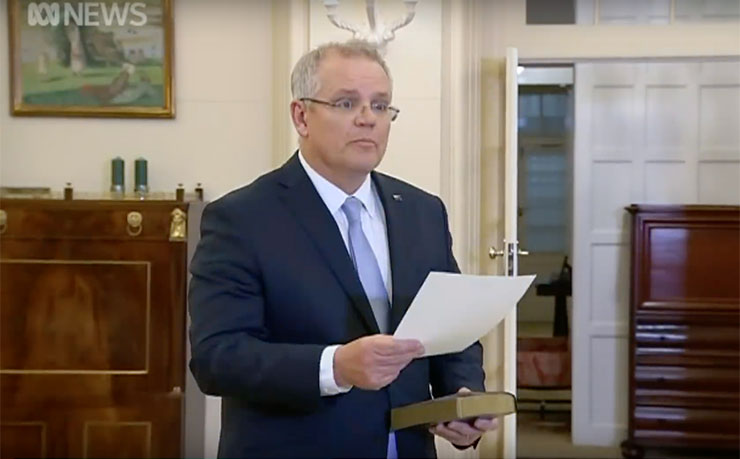
However, the Australian Coalition Government has responded to these two key existential threats to humanity by opposing both nuclear disarmament and requisite climate change action. Continuing inaction is not an option – the Paris commitments mean, in effect, a 3C temperature rise and, according to Professor Hansen and paleoclimatologists, eventual inundation of coastal areas by a 15-25 meters sea level rise.
A catastrophic plus 2-degree temperature rise is now effectively unavoidable given the remorselessly increasing atmospheric CO2, ocean heat content, and fossil fuel use for electricity generation, but we are obliged to do everything we can to make the future “less bad” for future generations.
What is to be done?
Turning off the lights and adding or subtracting clothing are excellent “micro” actions for individuals, but what are the “macro” actions we can take collectively right now to prevent further climate destruction, as demanded by the late Stephen Hawking and others?
We should, without delay, and with transitional policies in place for the creation of job generating industries, demand the cessation of fossil fuel production. The climate crisis demands such action if the worst effects are to be avoided, and notwithstanding the inevitable transition to renewable energy, albeit probably not soon enough.
The IPCC gave the planet 12 years before runaway climate change ensues, others are working on much shorter time frames – 15 years or less before the mass extinction of life on Earth.
Faced with the self-censorship of the corporate media, progressive populists should, as David McKnight suggests in Populism Now, name power, that is, identify the institutions, interests and elites complicit in creating and contributing to the climate emergency, including mainstream journalists, editors, politicians, academics, companies, financial institutions, corporate entities and individuals.
To be sure, we are all culpable when it comes to the climate emergency, but some entities vastly more so than others.
We also need to reframe our language and acknowledge the potential for what many commentators and climate victims (for instance, in the Marshall Islands) refer to as “climate genocide”.
References also abound to “climate violence”, “violent policy making”, and increasingly, “climate criminals”, with many legal experts linking climate policy failures to specific breaches of environmental and other laws.
Increasingly, there are calls for politicians, corporate and media chiefs to be held to account so that there is no statute of limitations and no place to hide for those promoting policies and actions that lead to speciescide, ecocide, sociocide, omnicide and terracide – words that have begun to spill into the public sphere.
Silence as violence
Following Norwegian peace scholar, Johan Galtung, this altered rhetoric recognises that violence does not simply come out of the barrel of gun, the bomb door or the clenched fist, but rather can occur through policies and practices that inflict direct and indirect harm on populations, despite these actions being deemed legal.
It’s not only the mainstream media that seeks to silence such talk. Interestingly, the algorithms of search engines can shy away from such language. For instance, the website “Climate genocide” which documents expert opinions on the worsening climate emergency fails to appear in a Google search, even though the same phrase is number two on page one of 30,000 results from a search using Microsoft’s Bing.
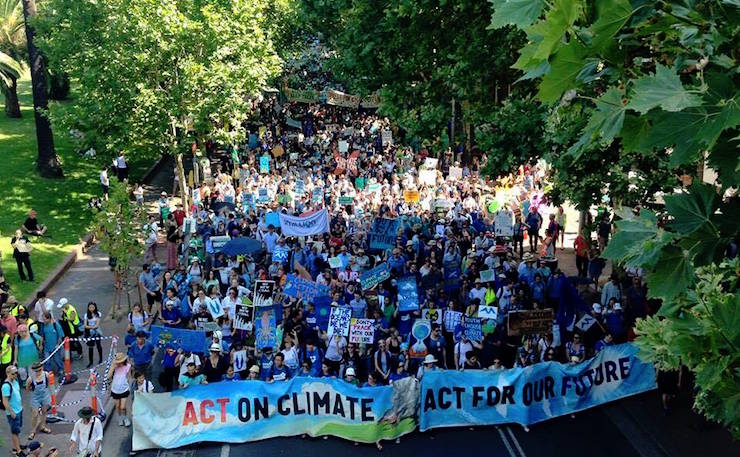
By the same token, the climate emergency receives much more attention in Australian publications like The Guardian, Green Left Weekly, Red Flag, Crikey and New Matilda than in most of the mainstream press. Indeed, the contestation over knowledge and ideas, and what passes as received wisdom, is pivotal to how this and future generations respond to the climate emergency.
The struggle over language, and its place in the domain of common sense, is integral to the struggle against violent power. Breaking the silence of the climate emergency is key to our future survival.
Donate To New Matilda
New Matilda is a small, independent media outlet. We survive through reader contributions, and never losing a lawsuit. If you got something from this article, giving something back helps us to continue speaking truth to power. Every little bit counts.

